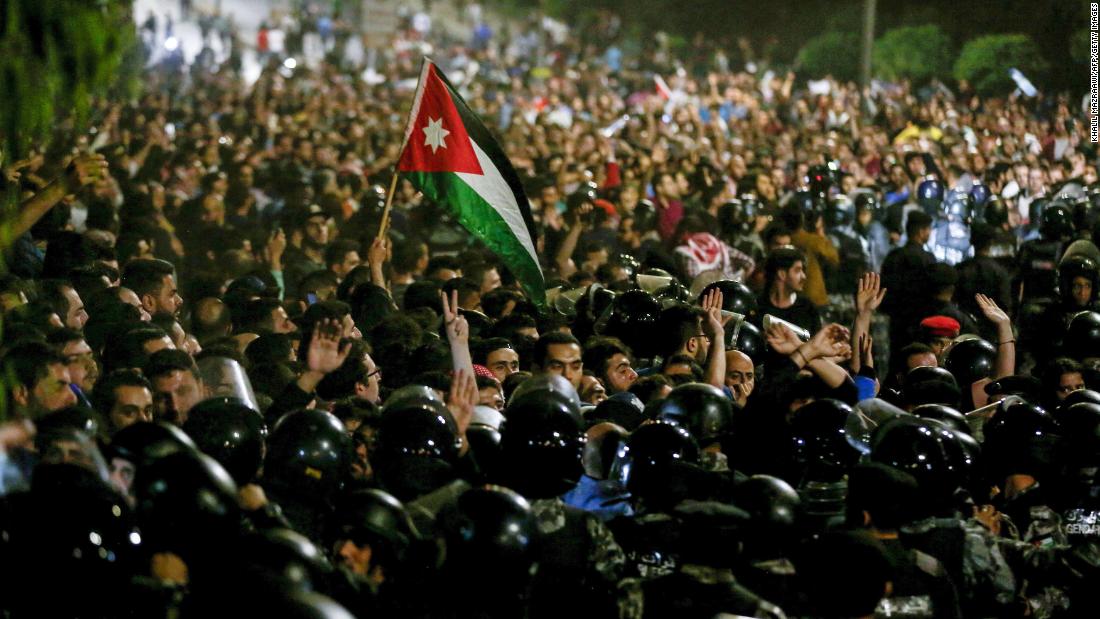Protests in Jordan
June 4, 2018 | Expert Insights

The Kingdom of Jordan saw hundreds of protestors gather in the capital city of Amman expressing dissatisfaction at tax and price increases.
The draft tax reform law has been proposed in the Parliament receiving the support of Prime Minister Hani Mulki. Reforms have been gradually implemented after Jordan received a $723 million credit line from the IMF in August of 2016.
Background
The relatively stable Hashemite Kingdom of Jordan is precariously located in West Asia neighbouring Israel, Syria, Saudi Arabia, and Iraq. A part of the cradle of civilisation, Jordan’s history dates back to the Paleolithic Period. Change in climate increased migration and trade during the Bronze Age. Small settlements and pastoral communities were in existence until Umayyad Caliphate provided the distinct Arab culture before Ottoman rule.
The area of Transjordan was granted independence from the British in 1946 as a sovereign constitutional monarchy. It was a founding member of the Arab League. Initial years after Independence saw participation in the wars against Israel parallel to liberalisation of society and economy.
Described as an “Oasis of Stability,” Jordan is strategically located at the crossroads between Asia, Africa, and Europe. Sans a short 26km shoreline in the Gulf of Aqaba, Jordan is a landlocked country. Although Jordan hosts a range of ecosystems, the country has limited natural resources. Nevertheless, owing to a skilled workforce, extensive trading, foreign remittances and tourism, the economy is classified as an emerging market.
Since the 2011 Arab Spring, Jordan had opened its borders for refugees fleeing the Syrian Civil War. Escalation in the conflict with ISIS increased the influx of refugees with many living in inhospitable camps at the borders. This act of goodwill to fellow Arabs has added to the economic stagnation with mounting public debt. The IMF approved credit line has been opened for three years from 2016 as a part of the Extended Fund Facility (EFF).
Analysis
Jordan’s government agreed to IMF’s terms of fiscal, monetary, and structural reforms in order to bring down debt from 94% to 77% of GDP by 2021. Suggested tax increase of 5% on employees and 20-40% on companies is a part of the reforms. Jordanians believe this will have a negative impact on the already sluggish economy.
After 4 nights of protests, many are calling upon the current monarch King Abdullah to intervene. He stated the need for dialogue for compromise but has backed PM Mulki in his stance. "Sending the draft law does not mean parliament will agree to it or even agree on its articles," Mulki told reporters on Saturday after meeting with trade union leaders.
According to the IMF website, reforms will be gradual to protect the poor and weak sectors of the economy. They also added that policies for social services and welfare programs will not be hindered. However, with subsidies on bread removed and the replacement of fuel subsidies by cash transfers, the average citizen faces significant hurdles. Support to the Palestinian administration, financially or otherwise, has added to their woes.
On the other hand, reforms to curb tax evasion, promote financial inclusion and increase investor production may provide a boost for the weak economy.
The Extended Fund Facility (EEF) has been implemented in many developing economies across Asia and Africa. In the case of Pakistan, the government repaid all debt in the face of the 2005 earthquake as well as the super floods of 2011. At the same time, many citizens lost their homes or died from apparent lack of government relief during the crises. Aid to Ghana saw a restructuring of their economy which shifted the resource rich, rice-producing country to import large quantities of rice at high prices. It may be observed that these aid packages have done more harm than good to countries buckling under pressure by signing IMF’s inequitable terms.
For Jordan, whose closest Arab allies are facing mammoth economic and humanitarian crises, financial aid is limited. The country, which runs on aid, requires extensive financing to provide food, shelter and opportunity to over a million Syrian refugees. It must be noted that the average cost of hosting a refugee is $3,000 as per a report from The Independent. Moreover, Jordan has provided refuge to scores of Palestinians who lost their homes to Israel since the 1948 war. Citizens face rising unemployment which further multiplies as most refugees are unemployed, thus, providing nothing to the country’s productivity or financial reserves.
Counterpoint
A report from Moody’s Investor Service says the tax reform will result in a “positive credit rating.” “The bill would help enhance fiscal stability and reduce the financial deficit to 1.9 per cent of the total GDP by 2019,” the report stated. Positive rating will improve investor confidence which is necessary for the growth of Jordan’s industries.
Assessment
Our assessment is that the government, under IMF pressure, will pass the draft tax bill. While there is hope for some compromise, the Jordanian economy requires large-scale structural overhaul to integrate unemployed Jordanians, Syrians and Palestinians alike. It is imperative that the government pass laws to increase industrial growth for improved productivity. However, this must not be at the cost of people’s wellbeing.








Comments